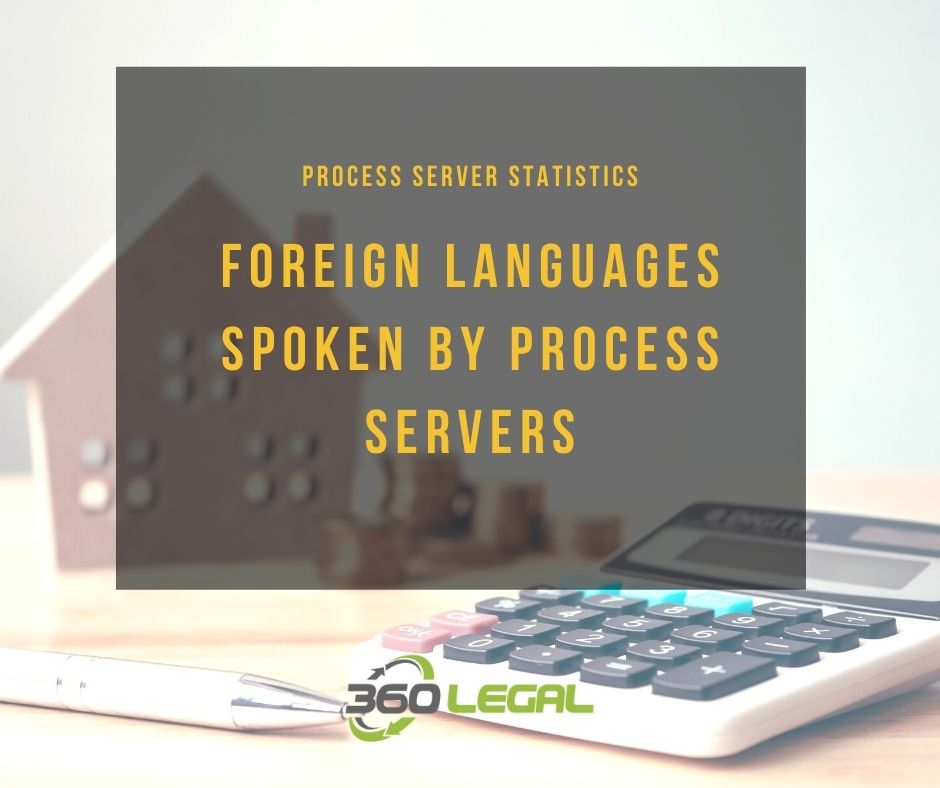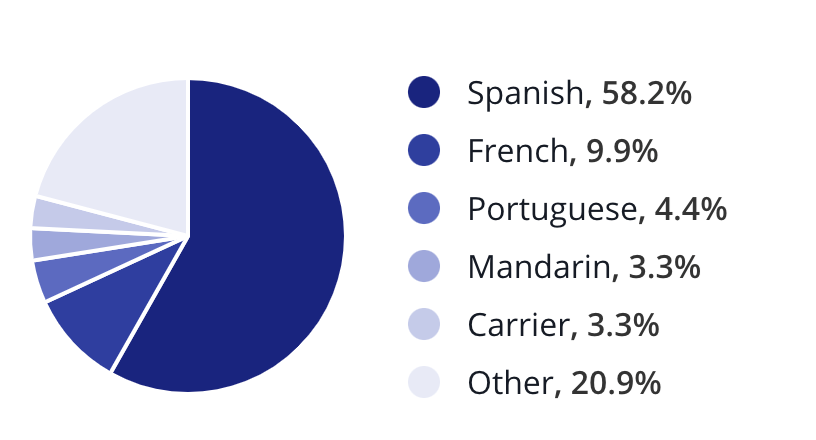Testing RSS Feeds.. ignore post.
Testing RSS Feeds.. ignore post.
Foreign Languages Spoken By Process Servers

Foreign Languages Spoken By Process Servers
According to the graph below, 58.2 percent of process servers in the United States are bilingual. This indicates that over half of process servers speak both English and at least one additional language. With the U.S. population becoming increasingly diverse, being bilingual can be a major asset for process servers who need to communicate effectively with people in their communities.
After English, Spanish, French and Portuguese are the most commonly spoken foreign languages among bilingual process servers.

Spanish Speaking Process Servers
As the second most widely spoken language in the United States, Spanish very likely has significant representation among bilingual process servers, even more so than French and Portuguese. Spanish is useful for serving immigrant communities from Mexico, Central America, South America, and the Caribbean. Major metros like Los Angeles, Houston, Miami, and New York have huge Spanish-speaking populations.
Being able to speak Spanish enables better communication and cultural connections with parties of Hispanic or Latino descent involved in legal matters. Fluency in the language allows process servers to explain details and answer questions for Spanish speakers not proficient in English. Sensitive documents and directives are better understood in one’s native language.
French Speaking Process Servers
Around 9.9% of bilingual process servers speak French. As a Romance language, French likely helps servers connect with French-speaking immigrants and French Creole speakers from Haiti, Louisiana, and various parts of the Caribbean and West Africa who have settled in the U.S. Major U.S. cities like New York, Los Angeles, Miami, and Houston have sizable French-speaking populations that process servers may encounter regularly.
Additionally, French remains an important language in international business, diplomacy, and culture. French skills allow process servers to communicate more effectively with French-speaking parties involved in cross-border legal matters. As global connectivity increases, so too does the value of speaking French for legal professionals.
Portuguese Speaking Process Servers
Portuguese is the third most widely spoken foreign language by bilingual process servers, at 4.4 percent. Portuguese is useful for connecting with immigrant communities from Portugal, Brazil, Angola, Mozambique, and other major Lusophone countries. There are growing Brazilian and Portuguese diasporas across the U.S., especially in metropolitan areas like Newark, NJ, Boston, MA, and Florida cities like Miami and Orlando.
Understanding Portuguese and Brazilian culture can help process servers properly serve legal notices and documents to parties who prefer to communicate in Portuguese. Since many recent immigrants may struggle with English fluency, Portuguese-speaking process servers provide valuable cultural insight and language assistance.
Beyond the top three, process servers likely speak other languages as well depending on local community demographics. For example, Spanish is broadly useful across the U.S. given the large Hispanic population. In areas with many Chinese, Tagalog, Vietnamese, Korean, Russian or Hindi speakers, knowledge of Asian languages is advantageous too.
Interpretation and Translation Services.
For process servers who only speak English, interpretation and translation services are essential tools to facilitate communication with non-English speaking parties.
Professional interpreters can join process servers on calls to provide real-time interpretation, ensuring proper understanding on both sides. This prevents confusion and helps collectors obtain the necessary information.
Additionally, having documents like summons, complaints, motions, and notices professionally translated by legal translators guarantees that non-English speakers fully understand the content. When handled competently, language barriers don’t preclude effective legal communication.
Cultural Awareness
Regardless of language capabilities, all process servers should prioritize cultural awareness when interacting with diverse communities. Each culture has different communication norms, behaviors, values, and customs that impact individual expectations and attitudes.
By demonstrating cultural understanding and adaptability, process servers build better rapport and trust with involved parties. This leads to smoother, more productive dialogue. When people feel respected, they tend to be more receptive and cooperative, which bolsters effective service.
In Summary
Bilingual process servers have a strategic edge today thanks to rising domestic diversity. English plus French, Portuguese and Spanish are particularly advantageous in legal services. For monolingual servers, retaining qualified interpreters and translators helps bridge language divides. However, cultural awareness is equally crucial when serving across cultures. Both linguistic and cultural competence allows process servers to thrive in an increasingly globalized environment.
T: +1 (888) 360-legl (5345)
@: info@360legal.net
Author
We are Social!
Latest tweets
Popular Tags
Testimonials
"5 star service ! prompt serving, helpful, professional . "
"Mike is awesome. Our firm has hired him on several occasions and we are very happy with his work. His prompt serving, helpful, professional and always in communication. I recommend him highly! "
"360Legal provides speedy and easy to use Process Service that is flexible, and very transparent with nearly instant reporting. It is very helpful for us to be able to track the status of our process service jobs, especially when they are time sensitive. "
Latest News
-

RMAI 2021 Annual Conference RMAI Annual Conference
April 12-15, 2021 -

NATIONAL CREDITORS BAR ASSOCIATION 2020 SPRING CONFERENCE
May 19-21, 2021 -

ALFN ANSWERS 2021
Jul 18-21, 2021 -

Annual Convention and Expo
Oct. 17-21, 2021 -

Florida Association of Professional Process Servers 33rd Quarter Board Meeting/Professional Beach Getaway
Aug. 20-22, 2021












